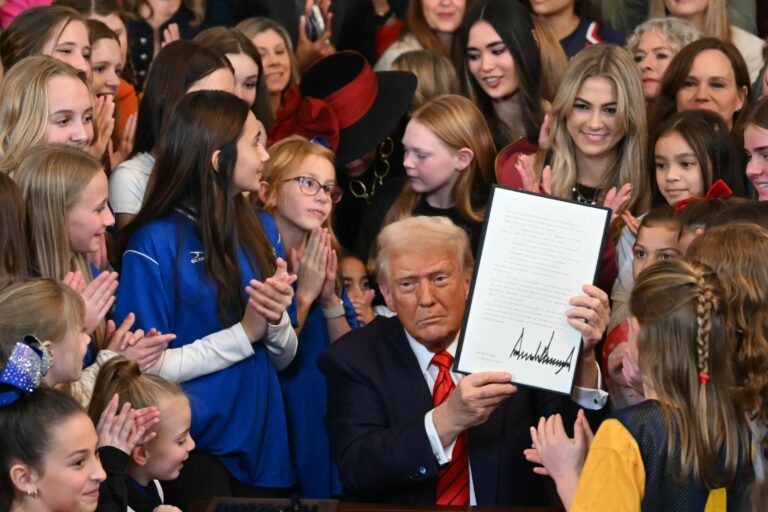Former President Trump’s Executive Order Restricts Transgender Student-Athletes in Women’s Sports
Overview of the Federal Directive on Transgender Participation in School Athletics
In a highly controversial move, former President Donald Trump enacted an executive order that bans transgender student-athletes from competing in girls’ and women’s sports within public schools nationwide. This policy, introduced amid heated debates over gender identity and athletic fairness, is intended by its proponents to safeguard equitable competition in female sports categories. However, opponents argue that it marginalizes transgender youth and contradicts efforts to foster inclusivity in educational settings. This development represents a pivotal moment in the ongoing national conversation about transgender rights and sports participation.
Key Elements of the Executive Order
- Applies to K-12 public schools receiving federal funding
- Enforces compliance through a reinterpretation of Title IX regulations
- Permits schools to exclude transgender girls from female sports teams
Supporters claim the order protects the integrity of women’s athletics by maintaining a level playing field, while critics warn it infringes on the rights of transgender students and fosters discrimination. The policy is expected to face numerous legal challenges as states and school districts navigate its implementation and broader implications.
| Aspect | Effect |
|---|---|
| Enforcement | Federal funding withheld from non-compliant schools |
| Target Group | Transgender female student-athletes |
| Coverage | Public K-12 schools with federal funding |
Effects on Transgender Students and Responses from Advocacy Organizations
The executive order has sparked notable concern among advocates for transgender youth, who argue that it deepens exclusion and discrimination against an already vulnerable population. Participation in school sports is widely recognized as vital for social development, mental health, and self-expression. By restricting access, the policy may exacerbate feelings of isolation and negatively impact the well-being of transgender students.
Leading advocacy groups have voiced strong opposition, emphasizing the broader consequences beyond athletics:
- Human Rights Campaign: Condemns the order as a violation of civil rights and is mobilizing legal efforts to challenge the policy.
- GLSEN: Highlights the necessity of inclusive school environments to ensure safety and belonging for LGBTQ+ youth.
- Trans Lifeline: Warns that exclusionary policies increase mental health risks, including depression and suicide among transgender adolescents.
| Association | Primary Concern | Response Strategy |
|---|---|---|
| Human Rights Campaign | Violation of civil liberties | Pursuing litigation and advocacy |
| GLSEN | School safety and inclusivity | Educational outreach and policy advocacy |
| Trans Lifeline | Mental health and suicide prevention | Providing crisis support services |
Judicial Responses and State-Level Policy Divergence
In the wake of the federal directive, numerous lawsuits have been filed by civil rights groups and several state governments, challenging the order’s constitutionality under the Equal Protection Clause of the Fourteenth Amendment. Legal experts anticipate that courts will grapple with complex issues surrounding the interpretation of Title IX and the extent of federal authority over gender identity in education.
State governments have exhibited polarized reactions:
- Progressive states such as California, New York, and Massachusetts have publicly denounced the order, with governors affirming protections for transgender athletes consistent with their gender identity.
- Conservative states including Texas and Florida have either enacted or proposed legislation reinforcing restrictions aligned with the federal policy.
| State | Official Stance | Current Policy |
|---|---|---|
| California | Opposes the federal order | Maintains protections for transgender athletes |
| Texas | Supports the order | Enforces new participation restrictions |
| New York | Litigates against the order | Upholds inclusive policies |
| Florida | Passed legislation supporting the order | Limits transgender girls’ participation |
- The ultimate legal outcomes remain uncertain as courts purposeful on constitutional and statutory interpretations.
- States continue to balance federal directives, public opinion, and advocacy pressures in shaping their policies.
Guidance for Educational Institutions Amid Policy Shifts
Schools nationwide are navigating a complex and evolving regulatory environment regarding transgender student-athlete participation. It is indeed essential for school administrators to adopt thoughtful approaches that ensure legal compliance while promoting an inclusive and supportive atmosphere for all students.
Recommended strategies include:
- Clear Communication: Engage openly with students, families, and staff to explain policy changes and address concerns.
- Supportive Resources: Develop counseling services and peer support networks to foster student well-being and reduce stigma.
- Professional Development: Offer sensitivity and inclusivity training for coaches, educators, and administrators.
- Data Monitoring: Track participation trends and policy impacts to inform responsive adjustments.
| Focus Area | Recommended Actions |
|---|---|
| Legal Adherence | Conduct regular policy reviews with legal counsel |
| Student Support | Expand counseling and inclusive extracurricular programs |
| Community Involvement | Host forums and informational sessions for stakeholders |
Conclusion: Navigating the Intersection of Rights, Identity, and Fairness
The executive order signed by former President Trump intensifies the national debate over transgender rights in the realm of school athletics. As legal battles unfold and public discourse evolves, the ramifications of this policy will continue to influence educational institutions and sports programs across the country. Stakeholders—including advocacy groups, policymakers, educators, and families—remain vigilant, highlighting the intricate balance between civil rights, gender identity recognition, and the pursuit of equitable competition.




